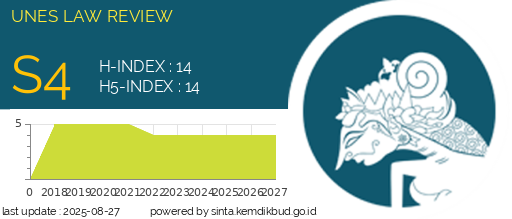UPAYA MEDIASI DALAM PENYELESAIAN SENGKETA EKONOMI SYARI’AH DI PENGADILAN AGAMA PADANG KELAS IA
DOI:
https://doi.org/10.31933/unesrev.v4i4.284Keywords:
Mediation, Sharia Economics, Religious CourtsAbstract
The Religious Courts based on Article 49 of the Law on Religious Courts have expanded their authority to settle sharia economic cases. Based on Article 10 of PERMA Number 14 of 2016 concerning Procedures for Settlement of Sharia Economic Disputes, it is emphasized that judges in ordinary examination procedures must seek reconciliation through mediation. In practice, mediation efforts are often unsuccessful, as happened in the Padang Religious Court, of the 4 sharia economic cases that were entered, only one case was successfully mediated. Based on the results of the research, discussion and analysis, it can be concluded: first, mediation efforts in resolving Sharia economic disputes at the Padang Religious Court are mediators using informative, educative and persuasive methods. In the Padang Religious Court, there are internal factors: (1) mediators from judges who do not have certificates, (2) mediation seems only a formality, External factors: (1) litigants who are reluctant to be mediated, (2) The place to hold mediation is not yet conducive so it is not comfortable to negotiate
Downloads
References
Agus Suprianto, Teknik Mediasi Ekonomi Syariah, makalah dalam Pelatihan Advokasi Sengketa Ekonomi Syairiah MUI pada 19-20 September 2019
Amran Suadi, Penyelesaian Sengketa Ekonomi Syariah Teori & Praktik Edisi Revisi, Kencana, Depok, 2017.
Komar kantaatmadja, Beberapa masalah dalam penerapan ADR di Indonesia dalam prospek dan pelaksanaan Arbitrase di Indonesia, Citra Aditya Bakti, 2001.
Syahrizal Abbas, Mediasi dalam Hukum Syariah, Hukum Adat, dan Hukum Nasional, Kencana, Jakarta, 2017.
SIPP Pengadilan Agama Padang tahun 2016-2020
Laporan mediasi Pengadilan Agama Padang tahun 2016-2020
Downloads
Published
How to Cite
Issue
Section
License
Hak cipta :
Penulis yang mempublikasikan manuskripnya di jurnal ini menyetujui ketentuan berikut:
- Hak cipta pada setiap artikel adalah milik penulis.
- Penulis mengakui bahwa UNES Law Review berhak menjadi yang pertama menerbitkan dengan lisensi Creative Commons Attribution 4.0 International (Attribution 4.0 International CC BY 4.0) .
- Penulis dapat mengirimkan artikel secara terpisah, mengatur distribusi non-eksklusif manuskrip yang telah diterbitkan dalam jurnal ini ke versi lain (misalnya, dikirim ke repositori institusi penulis, publikasi ke dalam buku, dll.), dengan mengakui bahwa manuskrip telah diterbitkan pertama kali di Jurnal UNES Law Review.



















